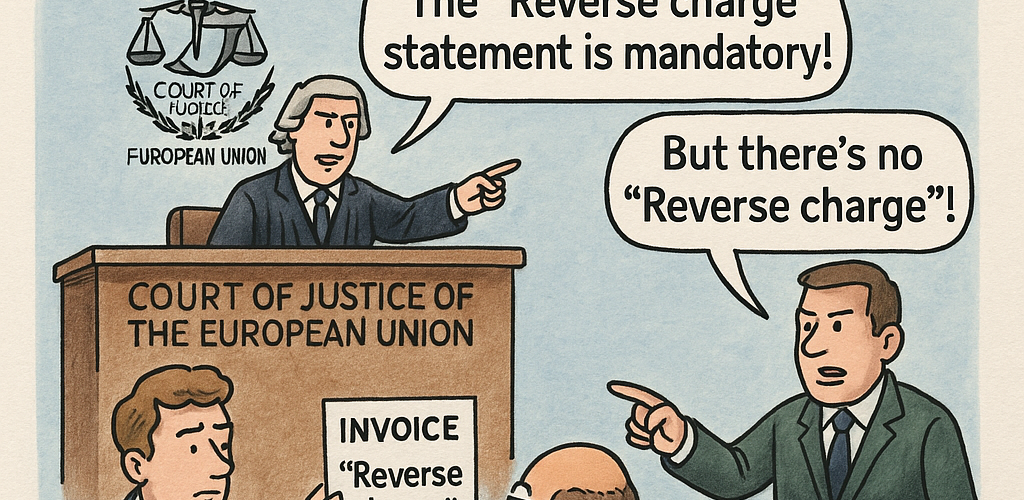Subject: Analysis of CJEU Judgment on VAT, Triangular Transactions, and “Reverse Charge”
Executive Summary:
This briefing analyzes the Court of Justice of the European Union (CJEU) judgment in Case C-247/21, concerning Value Added Tax (VAT) implications in triangular transactions. The key issue revolved around whether the omission of the phrase “Reverse charge” on an invoice issued within a triangular transaction could be rectified retroactively. The CJEU ruled that the “Reverse charge” mention is mandatory on invoices for the final customer in a triangular transaction to be validly designated as liable for VAT and that omitting it cannot be retroactively corrected. This judgment reinforces the strict interpretation of invoicing requirements under the VAT Directive to ensure clarity and prevent tax avoidance.
Background:
The case originated from a dispute between Luxury Trust Automobil GmbH (an Austrian company) and Finanzamt Österreich (the Austrian Tax Office) regarding VAT claimed for the tax year 2014. Luxury Trust Automobil bought vehicles from a UK supplier and resold them to a Czech company (M s. r. o.). The vehicles were transported directly from the UK to the Czech Republic. Luxury Trust Automobil’s invoices mentioned an “Exempt intra-Community triangular transaction” but did not include the phrase “Reverse charge.” The Austrian Tax Office deemed this a failed triangular transaction, leading to an assessment of VAT due by Luxury Trust Automobil in Austria.
Key Issues & CJEU Ruling:
The Verwaltungsgerichtshof (Supreme Administrative Court, Austria) referred three questions to the CJEU:
Is a mention of “Exempt intra-Community triangular transaction” sufficient to designate the recipient as liable for VAT if the invoice doesn’t show VAT and lacks the phrase “Reverse charge?”
- CJEU Ruling: No. Article 42(a) of the VAT Directive, read with Article 197(1)(c), requires the specific words “Reverse charge” to be present on the invoice for the final customer to be validly designated as liable for VAT in a triangular transaction. Other statements are not sufficient substitutes.
- Quote: “Article 42(a) of [the VAT Directive] in conjunction with Article 197(1)(c) of that Directive … to be interpreted as meaning that the person to whom the supply is made is to be designated as liable for payment of VAT if the invoice, which does not show the amount of value added tax, states: “Exempt intra-Community triangular transaction”? No”
If the first question is answered negatively, can the invoice be retroactively amended to include a statement about the transfer of tax liability?
- CJEU Ruling: No. The omission of “Reverse charge” cannot be retroactively corrected. This is not a simple formal requirement that can be amended. Fulfilling a mandatory condition for the transfer of VAT liability does not constitute a “correction” but the initial issuance of the required invoice.
- Quote: “Article 226(11a) of [the VAT Directive] … must be interpreted as meaning that the omission, on an invoice, of the words ‘Reverse charge’ required under that provision may not subsequently be corrected by adding a statement that that invoice relates to an intra-Community triangular transaction and that the tax liability is transferred to the person to whom the supply is made.”
Which Member State’s invoicing rules apply: the intermediary acquiring the goods or the final customer?
- CJEU Ruling: The CJEU deemed it unnecessary to answer this question because, regardless of the applicable law, the absence of “Reverse charge” invalidates the designation of the final customer as liable for VAT. EU law requires that Articles 42, Article 141(e), and Article 226(11a) of the VAT Directive cannot vary from one Member State to another.
- Quote: “In any event, the requirements set out in Article 42, Article 141(e) and Article 226(11a) of the VAT Directive cannot vary from one Member State to another.”
Rationale:
The CJEU emphasized the importance of clarity and certainty in VAT obligations. The “Reverse charge” mention serves a crucial function:
- Informing the recipient: It clearly informs the invoice recipient (the final customer) that they are responsible for the VAT.
- Preventing uncertainty: It removes ambiguity regarding tax liability, essential for proper VAT collection and to avoid double taxation.
- Ensuring awareness: It makes certain that the final recipient of a supply is aware of his or her tax obligations.
Implications:
- Strict Compliance: Taxable persons involved in triangular transactions must strictly adhere to the VAT Directive’s invoicing requirements, particularly the explicit use of “Reverse charge.”
- No Retroactive Fixes: Failure to include “Reverse charge” cannot be remedied retroactively, potentially leading to VAT assessments in the intermediary’s Member State.
- Risk Mitigation: Businesses must implement robust internal controls to ensure correct invoicing in triangular transactions to avoid penalties and tax liabilities.
Conclusion:
The CJEU’s decision in Case C-247/21 reinforces the importance of precise invoicing practices in triangular transactions. The mandatory nature of the “Reverse charge” mention aims to ensure clarity, prevent tax avoidance, and facilitate proper VAT collection. Businesses must prioritize strict compliance with invoicing requirements to mitigate potential VAT risks.
See also
- Join the Linkedin Group on ECJ/CJEU/General Court VAT Cases, click HERE
- VATupdate.com – Your FREE source of information on ECJ VAT Cases
Latest Posts in "European Union"
- ECG T-96/26 (TellusTax Advisory) – Questions – VAT deductions in the event of different VAT treatment between Member States
- VIDA Measures applicable from 1 January 2027
- Agenda of the ECJ/General Court VAT cases – 7 Judgments and 2 Hearings till March 25, 2026
- Comments on T-638/24: Double dip alert – an incorrect invoice can create multiple VAT liabilities
- VAT IOSS Scheme: Intermediary Registration Available from April 2026 for Non-EU Businesses














